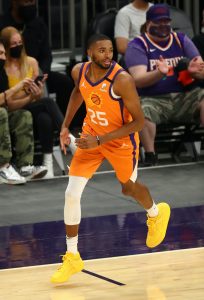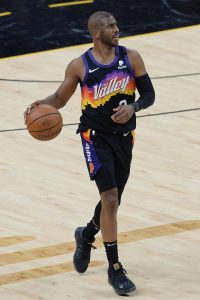Hoops Rumors is breaking down the 2021 offseason for all 30 NBA teams, revisiting the summer’s free agent signings, trades, draft picks, departures, and more. We’ll evaluate each team’s offseason moves and look ahead to what the 2021/22 season holds for all 30 franchises. Today, we’re focusing on the Phoenix Suns.
Free agent signings:
Note: Exhibit 9 and 10 deals aren’t included here.
- Chris Paul: Four years, $120MM. Third year partially guaranteed. Fourth year non-guaranteed. Re-signed using Bird rights.
- Cameron Payne: Three years, $19MM. Third year partially guaranteed. Re-signed using Early Bird rights.
- JaVale McGee: One year, $5MM. Signed using non-taxpayer mid-level exception.
- Abdel Nader: Two years, $4.16MM. Second-year team option. Re-signed using Bird rights.
- Frank Kaminsky: One year, minimum salary. Re-signed using minimum salary exception.
- Elfrid Payton: One year, minimum salary. Signed using minimum salary exception.
- Chandler Hutchison: Two-way contract.
Trades:
Draft picks:
Contract extensions:
 Mikal Bridges: Four years, $90,000,000. Starts in 2022/23.
Mikal Bridges: Four years, $90,000,000. Starts in 2022/23.- Landry Shamet: Four years, $42,500,000. Includes non-guaranteed third year and fourth-year team option. Starts in 2022/23.
Departing players:
Other offseason news:
- Hired Bryan Gates, Michael Ruffin, and Jarrett Jack as assistant coaches; lost assistant coach Willie Green.
- Parted ways with senior vice president of basketball operations Jeff Bower.
- Dario Saric continues to recover from a torn ACL and is expected to miss most or all of the season.
- Were unable to reach a contract extension agreement with Deandre Ayton.
Salary cap situation:
- Remained over the cap and below the tax line.
- Carrying approximately $128.4MM in salary.
- $4,536,000 of non-taxpayer mid-level exception still available ($5MM used on JaVale McGee).
- Full bi-annual exception ($3,732,000) still available.
The Suns’ offseason:
Phoenix’s 8-0 run during the 2020 summer restart at Walt Disney World portended the team’s jump in the standings in 2020/21, but even the most optimistic of Suns fans must have been pleasantly surprised by just how successful a season it was.
After finishing below .500 for six consecutive years and missing the playoffs for an entire decade, the Suns put up the second-best regular season record in the NBA (51-21) and knocked off the Lakers in the first round of the playoffs, then just kept winning. Phoenix ultimately got within two games of the title before being stopped by the Bucks.
The Suns benefited from a little injury luck during their 2021 playoff run, but their success wasn’t a mirage — this is a deep, talented roster, and the club’s offseason moves reflected a desire to keep the group intact.
That meant re-signing Chris Paul, even if the idea of committing four years and $120MM to a 36-year-old may have been hard to swallow for team owner Robert Sarver. Fortunately for the Suns, only the first two years of that contract are fully guaranteed, which means that even if Paul’s performance drops off a cliff in the next year or two, it should never become a major albatross.
For comparison’s sake, CP3’s new deal includes less total guaranteed money ($75MM) than John Wall was still owed ($91.7MM) at the time the Rockets shut him down indefinitely earlier this year, and about the same amount ($74MM) that Kemba Walker was owed when he reached a buyout agreement with the Thunder.
The Suns locked up three more of their own free agents, re-signing Cameron Payne, Abdel Nader, and Frank Kaminsky. Nader and Kaminsky will play modest roles, but bringing back Payne as Paul’s backup following his career resurgence was crucial. Securing him to a new deal helped allow Phoenix to package its third-string point guard – Jevon Carter – with a first-round pick in a deal for another floor-spacing wing, Landry Shamet.
Carter is a solid defender, but reliable outside shooters like Shamet are harder to come by in today’s NBA, and the win-now Suns were unlikely to draft an immediate contributor with the No. 29 pick, so the deal made sense — especially since Phoenix was able to replace Carter on the depth chart by signing another defensive specialist, Elfrid Payton, to a minimum-salary contract.
The Suns’ other notable outside free agent addition was JaVale McGee, a solid veteran center who can help Deandre Ayton match up with star big men like Nikola Jokic, Anthony Davis, and Rudy Gobert in the playoffs.
Phoenix’s offseason signings didn’t push team salary for 2021/22 into tax territory, but the club projects to be a taxpayer starting in ’22/23. That knowledge informed many of the team’s remaining roster moves.
For instance, the Suns were unwilling to exercise Jalen Smith‘s 2022/23 team option after having drafted him with the 10th overall pick less than a year ago. There has simply been no room in the rotation for Smith since he arrived in Phoenix, and the club clearly didn’t expect that to change much going forward. Rather than paying Smith a $4.67MM salary in ’22/23, the team will likely sign a minimum-salary player next year to be that emergency big man off the bench.
The Suns also didn’t complete a rookie scale extension for Ayton, a former No. 1 overall pick, despite the fact that so many other members of his draft class (a record-setting 11) got new deals. Ayton’s camp reportedly refused to entertain anything less than a five-year, maximum-salary contract, which Phoenix was unwilling to offer.
Waiting until restricted free agency to work something out with Ayton is a risky move for the Suns, since it opens the door to some less desirable outcomes. Phoenix may have to match an offer sheet that features a trade kicker and an early opt-out. There’s even a chance Ayton could accept his one-year qualifying offer, putting him on track for unrestricted free agency in 2023.
But the franchise appeared more comfortable taking those risks than making such a significant financial commitment to its starting center. The best-case scenario for the Suns is that a lack of suitors with cap room results in no offer sheet for Ayton, who in turn accepts a little less than the max to remain in Phoenix, like John Collins did with Atlanta this past offseason.
The Suns did complete rookie scale extensions for Shamet and Mikal Bridges, viewing them as core players who could be locked up at a reasonable price (about $10.6MM per year for Shamet and $22.5MM annually for Bridges).
The Suns’ season:
Paul won’t play at an All-NBA level forever, but further improvements from young players such as Devin Booker, Ayton, and Bridges could offset some regression from the future Hall-of-Fame point guard. And while there are plenty of talented teams in the West, there’s not one that stands out as the clear-cut favorite to win the conference, like the Warriors were from 2016-19. Another deep playoff run is a reasonable goal for Phoenix.
One more trade to address the hole left by Dario Saric‘s ACL injury would help solidify the Suns’ place as a legit title contender, but assuming Paul doesn’t take a major step back and the team isn’t plagued by more bad injury luck, the biggest question marks in Phoenix this season may be about off-the-court issues, rather than on-court talent.
Will Ayton be distracted at all by his contract situation? Will the rumored report accusing Sarver of a series of misdeeds see the light of day? If so, will those allegations be deemed credible enough to cause an ownership shake-up?
The Suns won’t sneak up on anyone in 2021/22, so it will be fascinating to see how capable they are of defending their Western Conference crown with a target on their backs and potential off-court distractions looming.
Salary information from Basketball Insiders and Spotrac was used in the creation of this post.

